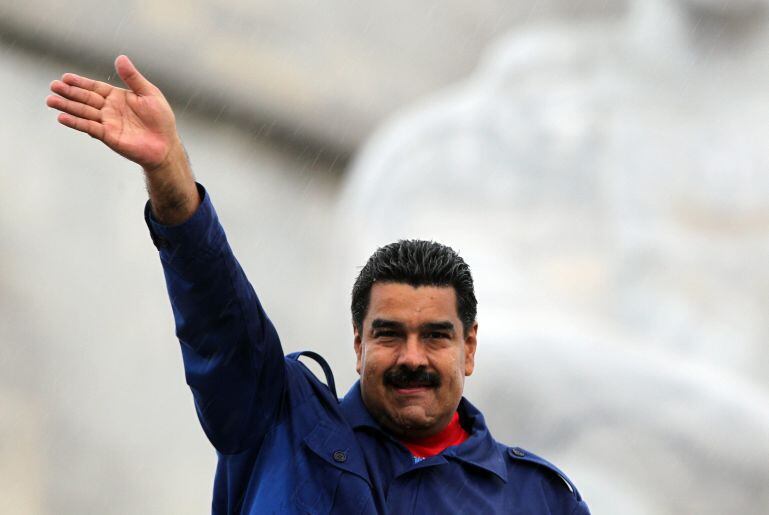
March 8, 2013 Nicolas Maduro swore to assume the presidency of Venezuela with “firm hand”a promise that today, when he celebrates ten years in office, is still alive and has been fulfilled to the letter, especially when the political tension and the multiple enemies of the Bolivarian revolution threatened his continuity in power.
The heir to Hugo Chávez (1999-2013) has governed for eight stormy years and the last two of apparent calm, a positive streak that leaves behind all kinds of tribulations that have resulted in hundreds of deaths in protests, international isolation, sanctions, and economic crisis. and mass migration.
Below is a summary of Maduro’s 10 years in power:
2013: A rookie with doubts
In his debut year, Maduro fed up Venezuelans with the idea of him as the son of Chávez, whom he said he would imitate, and even “hear”after his death, in an attempt to make it clear that he brought the continuity of the revolution, that he came from a five-year period of prosperity.
His victory in the elections was questioned by a part of the local opposition that never considered it legitimate.
2014: Contraction and Repression
The most radical wing of the opposition defied the government and took the streets for weeks with protests calling for the president’s resignation. The police and military response to the demonstrations left a balance of 43 dead, as well as dozens of injured and detained.
The crisis did not falter Maduro, who was more concerned about the economy than halted its growth.
2015: Shortage and Defeat
With the contracted economy, the shortage of products worsened, which increased popular discontent, a panorama capitalized on by the opposition that achieved a resounding victory in the legislative elections and retained two thirds of Parliament, for the first time with an official minority.
2016: The threat of recall
Promoted by Parliament, the idea of revoking Maduro’s mandate gained strength, once again with streets full of protesters who saw in this constitutional mechanism a way to peacefully leave Chavismo. Justice and the electoral body came out in defense of the president and arrested the recall, considering that the process lacked legitimacy due to allegations of fraud by Chavismo. Discontent pushed thousands to leave the country.
2017: Seen as authoritarian
A decision by the Supreme Court to remove powers from Parliament encouraged the largest wave of anti-government demonstrations of the decade, which resulted in 127 deaths, the unilateral establishment of a plenipotentiary Constituent Assembly made up only of pro-government supporters and a broad international rejection of Chavismo.
The Prosecutor’s Office accused Maduro of having broken the constitutional thread.
2018: Crisis, Elections and Assassination
The scarcity affects all spheres of life in Venezuela, where there are protests over hunger, as well as children dying in hospitals without medicine, while the migration of Venezuelans in search of some economic improvement overflows.
Maduro is re-elected in the presidential elections with the lowest participation, practically without opposition and with wide international questioning. Months later, the president suffered a frustrated assassination in a public act, the first televised after dozens of complaints of similar plans in the past.
2019: Challenges and Sanctions
The then head of Parliament, Juan Guaidó, proclaimed himself “Acting President” of Venezuela and, with the support of some 50 countries, creates a kind of “parallel state” that wrests control of assets abroad from Chavismo, while international sanctions against the country, which can no longer market its oil, intensify.
Maduro calls for calm and remains in power.
2020: The pandemic
The global chaos caused by the covid-19 pandemic brought the longed-for political stability to Chavismo. With the country in quarantine, the questions were silenced and only the voice of Maduro, as the only authority, imposed order and guidance during that year that ended with the dissolution of the Constituent Assembly and the election of a new Parliament.
2021: End of the fall
The return of Chavismo to Parliament by an overwhelming majority and the holding of regional and municipal elections, as well as the rejection of the call “interim government”helped relegitimize Maduro before the international community.
Furthermore, the economy stopped its decline after seven years, and began to grow in the second half of the year.
2022: Economic growth
Venezuela completed in 2022 one of the highest economic growth in the world, good news that, although it is insufficient for the severity of the preceding crisis, has revived the productive apparatus and the country’s expectations, especially in view of the 2024 presidential elections, the event that is marking the current year.
Source: EFE
Source: Gestion
Ricardo is a renowned author and journalist, known for his exceptional writing on top-news stories. He currently works as a writer at the 247 News Agency, where he is known for his ability to deliver breaking news and insightful analysis on the most pressing issues of the day.












